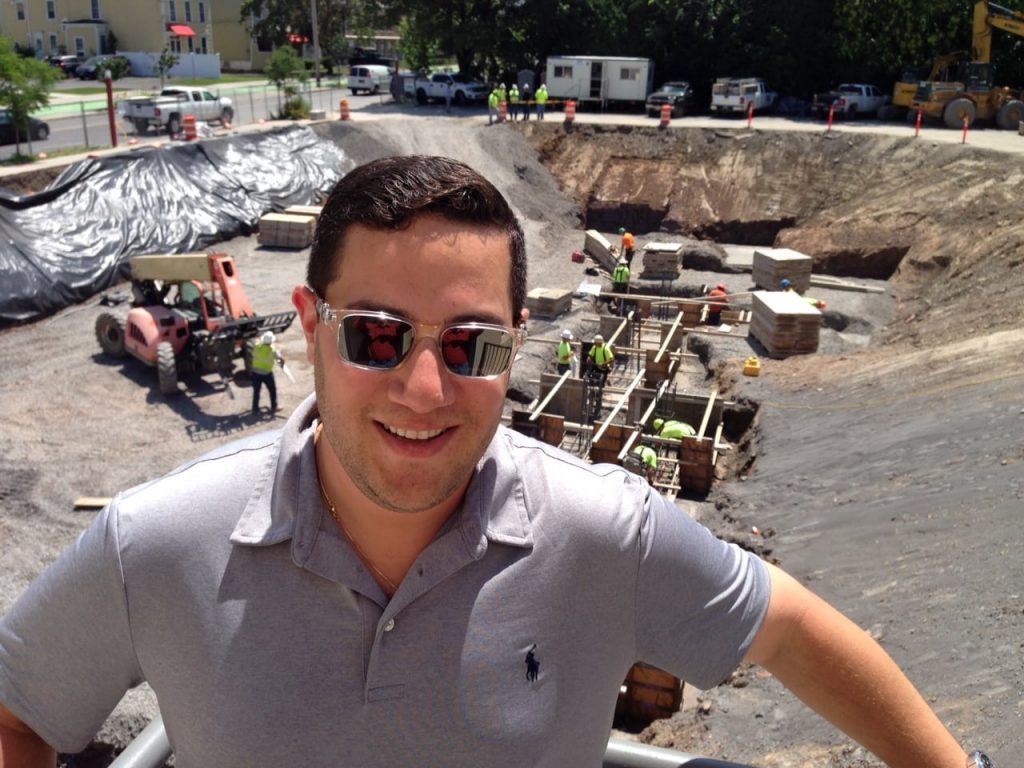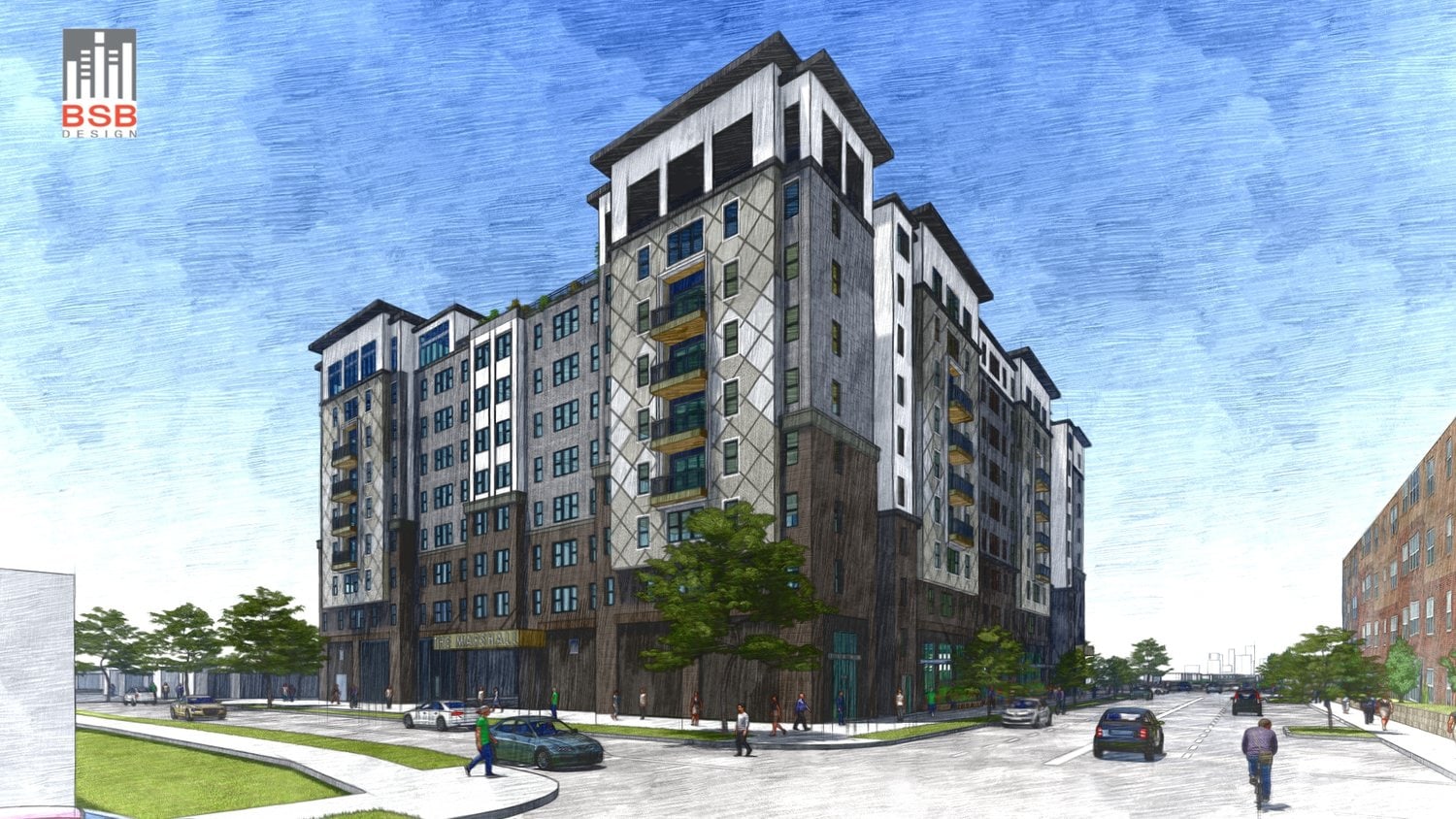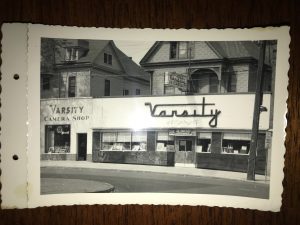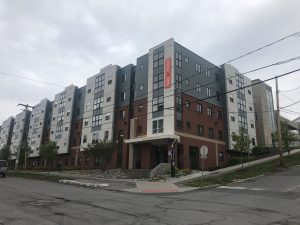Meet the man who built The Marshall
Meet the man who built The Marshall

At only 34, Jared Hutter is a rising national player in the student housing sector. The Syracuse alumnus’ New Jersey-based Aptitude Development, founded in 2014, built and manages The Marshall, a 287-bed building that towers over the modest storefronts and restaurants on Syracuse University’s commercial artery. The Marshall is Hutter’s second SU project. His first, what was BLVD 404 on University Avenue, opened in less than a year and was acquired by a national housing company not long after for $23.1 million.
Next year, Hutter will open larger student-housing projects at Coastal Carolina University and Louisville. By the end of 2019, he hopes to break ground on a project at the University of Arkansas, and he’s considering projects at the University of Alabama and elsewhere, including in California. “We’re on a lot of college campuses now,” Hutter says, sipping iced coffee at a coffee shop near his home in Millburn, New Jersey. “We’ve got five or six projects in pre-development stages, in additional to Louisville and Coastal Carolina. We’re going to have 10,000 beds in the next seven years.”
As he builds a national real estate company, Hutter spoke to reporter Matthew Gutierrez about his vision for Marshall Street, his contentious relationship with Syracuse University, and the future of the student housing market.
What’s your goal with The Marshall?
We’d love to buy Marshall Street. I have tried to buy every building there. In my opinion, there are two issues. First, there’s so many owners. Issue No. 2, most of those owners also operate businesses. The value to them is different from a regular real estate owner who can say, OK, here’s my rent. Because you also have to buy a person’s businesses, which is also their livelihood.
How would you assess Syracuse’s student housing market?
There’s two types of universities. There’s a lot out there that are forward-thinking on student housing. Now, universities use housing as a recruitment tool. Kids are much smarter now, much more in-tune to the overall living experience, so when you’re coming, we’ve had people tour The Marshall as prospective students. There are a lot of schools embracing housing. They can use their balance sheet and their land to focus on building the school. Louisville is a perfect example. They work with private developers. They have an on-campus apartment. They have a one-year on-campus requirement. We’re not infringing upon what they’re trying to do. But they look at us and say, ‘We don’t want to house people after freshman year.’ They want to increase the size of the school.
Syracuse doesn’t look at it that way. They talk about a three-year living requirement, which in my mind is insane. Nobody wants to live on campus for three years. I think it will become a deterrent for the school. Other campuses, the whole area is really nice and a great feel. Syracuse? You got dumpy Marshall Street. There’s nothing there. I hope the university becomes more forward-thinking and works with private developers to upgrade the areas. Somebody should take a bulldozer down Marshall Street and start fresh. It doesn’t have to be big buildings. The area is holding the university back.
Got your eye on anything else near SU at the moment?
We’re focused on other markets. I think Syracuse is tapped out. You have people talking about other projects, but I wouldn’t invest a lot more there right now with the way the university is acting, the way the city is not really open to it. The university isn’t growing. They raised their tuition the other day. It costs somebody over $70,000 a year, that’s an insane amount of money to go anywhere. But you’re walking out with a Syracuse degree. It’s not a Harvard degree.

What have you learned so far about student housing?
We thought we knew everything when we did our first project. We didn’t do any single units. I bought twos and fours, some threes. We got so much interest for single-occupancy units. The market across the country in student housing has changed. People want to live by themselves now, especially with larger buildings. We have made it clear we are not going crazy on amenities. You want walking distance to the school and bars. Best location in the market has to be it. We tried to go real long term and say, ‘If we still own this property in 20 years, are we confident we still will have a great location?’ The other thing we look at, safety wise, ‘Would you let your daughter live here?’ That also goes into location. Most college campuses are not in the best areas. We don’t want to get involved where we’d be skeptical.
Did you expect to sell BLVD 404 [U Point] so quickly?
No. Not at all. My partner and I joked, ‘Our kids will fight about this.’ Our plan was to build that, put it away, have our kids fight about it one day and move on to other markets. The opposite happened. We sold the building and instead of moving to other markets, we moved up the street. We got approached with someone with a real interest. We said we weren’t interested. But after about the fifth offer, we said, well, OK, now you’re offering a number where we almost have to say yes. We’re not doing any projects that we necessarily intend to sell very quickly. But again, if we get an offer that enticing, we have a responsibility to our investors that we have to do it.
What about The Marshall?
We’re going to hold. We’re in the process of refinancing the building right now. That’s a very special asset. You can’t replace that location. We plan on holding that for a while.
What kind of interaction did you have with the university when you were building this?
I’ve got a real problem with Syracuse University right now. They’ve been giving us a hard time since day one. We have no idea why, we can’t seem to figure it out. We have an easement for the walkway between Marshall Square Mall and South Crouse Avenue. They were giving us a huge hard time about closing that down or relocating part of it.
We went to them and said, ‘We want to shut this down temporarily.’ They gave us a hard time. They always make our life not easy. I’ve been trying to meet with the chancellor for three years. I sent him emails. They flat out ignore us as alumni coming back, in their 30s, who have now invested over $70 million in Syracuse.
I recently pulled back two significant pledges to the university – one to Whitman, another one to the athletic department. I tried to meet with the chancellor. The day before we were scheduled to meet, they called me and said he’ll be out of town. ‘He can’t meet with you, but you can meet with these other two people.’ So they put me up with Mike Haynie and the new CFO [Amir Rahnamay-Azar]. They make the meeting in Crouse Hinds. I get off the elevator. The chancellor is standing there. Don’t just lie to me and say he’ll be out of town. They have no interest in talking to us. The meeting was not so good. Amir seemed to hate us.
The chancellor at Syracuse doesn’t get it at all. We’re sick of it at this point. We’re absolutely done with him. He’ll never see any more money from us anytime soon.
Why?
They sent me a bill the other day for a quarter million dollars for impeding access on their easement. It’s my property. They have a legal easement. They say, well we impinged on their easement for a period of time. We had an agreement with them. They sent us this bill out of the blue for $245,000. I got an email one day, April 10. It wasn’t just here is the bill. It was detailed. That’s how you want to make friends? They have now made an enemy of us when they could have had a friend.
They have alienated a huge group of alumni. They don’t even know, we have a huge investor group of people our age, people much older, all Syracuse alumni. The university has no idea they’re alienating some major donors in the university.

Why do you think the university doesn’t want to talk to you?
I don’t think they like how quickly we sold our first building when I talked about how I wanted to hold it. You know what? I got a crazy offer and the people we sold it to made the building way better than we did.
[At the Marshall,] we got rid of a really disgusting, crappy building. That place was awful. That doesn’t represent a first-class university. We took down an awful building on contaminated soils. There’s no way that building met safety code. Older buildings don’t. It was a timber box that was going to explode. We had a brand new, concrete, steel, safe building there and got rid of a bar, whether people like it or not, that was constantly serving underage kids alcohol. The students may not be happy we did it, but the university should know they got rid of that junk and we have national retailers coming in.
We’re excited about what we’re doing for the area, and the university doesn’t want to work hand in hand. If we all sat down, it’d help both sides. At some point, they’ll tear down the mall. Why not at least talk to us? I hope they don’t think that when they go down to tear the mall they’re not going to have some neighbor issues they need to talk about it.
Here we are in 2019, with a number of luxury housing options for students at Syracuse, and beyond. Do you worry about an oversupply?
Yes. You always have to look at that on a market-to-market basis. We have passed on deals in markets where we were concerned about our location, new supply coming in. There are markets you have to be more cautious.
There’s no recession at a university. People know it. It’s becoming much more institutional with third-party management companies. Student housing conferences, I was at one five years ago with 500 people there. I was at one last week and there were 1,400 people there. The growth is crazy.
Do you see the student housing market continue to get bigger?
Oh, yeah. Deliveries of new student housing have dropped a bit because they peaked. But it’s about 40,000 new beds a year. You need to also replace older stuff on campus, so it’s not just a one-for-one. There are outdated spots on campuses that need to get changed.
What do you think about the Euclid area? Could those older homes get developed into luxury buildings?
It’s tough. The question is, how do you go about that? There are so many different property owners. It would take the university to buy up a whole bunch of stuff and say we’re expanding the campus. It would be very tough for a private developer to do. There are things a private developer can do better than a university, and there are things universities can do things we can never dream of.
This interview has been edited and condensed for clarity.








